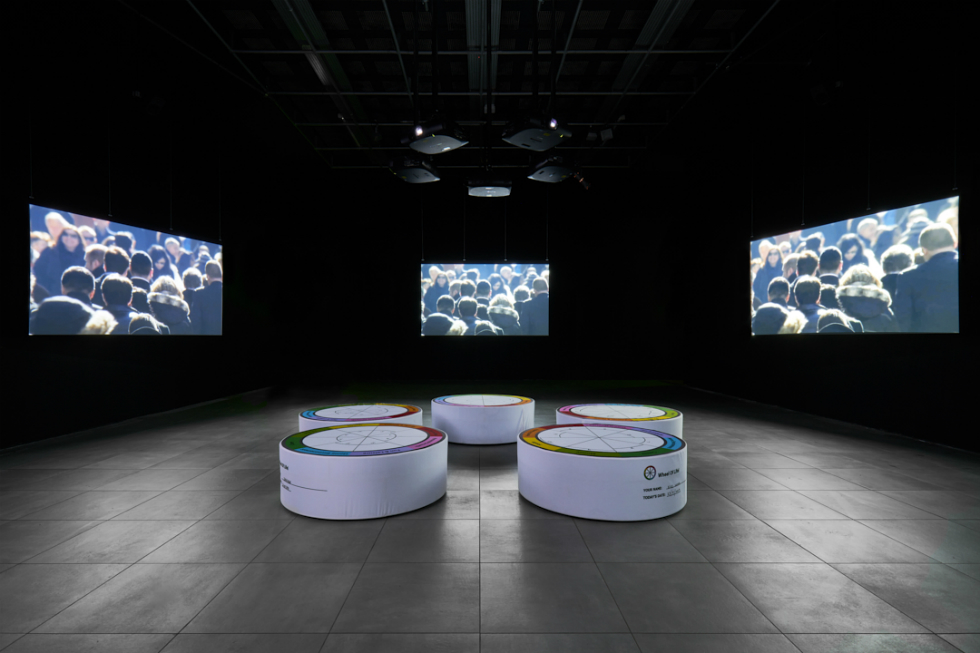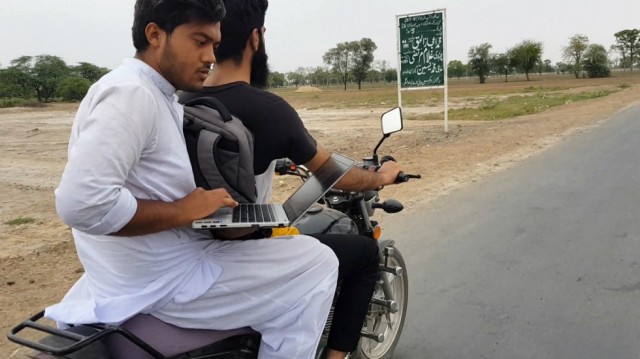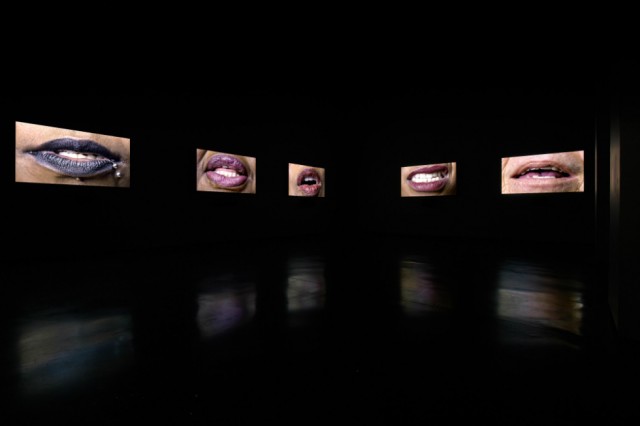“Energise, organise and optimise.” REAL WORK – Reviewed

A pair of new shows seeking to give voice to “those who typically remain unheard” is strangely lacking, finds Mike Pinnington…
FACT Liverpool’s Gallery 1: A man speeds along on the back of a motorcycle; laptop open, he types away. Sans helmet, he’s seemingly – profoundly – oblivious to his immediate surroundings and any potential risk. As a visual metaphor for life as a freelancer, in many respects, it’s kind of on the money. No paid sick leave, holidays, pension plan or god knows what else, we freelancers must be fleet of foot, proactive, reactive and always ‘on it’.
The man is Zahid Iqbal, a graphic designer based in Pakistan. Zahid is one of five ‘gig workers’ (a common term which erroneously makes it all sound such a laugh – chortle!) currently appearing in artist Liz Magic Laser’s In Real Life, an exhibition addressing freelancers’ working habits. On separate screens, we follow our stars across five episodes of an ‘experimental reality show’, as they each embark on a programme of ‘bio-hacking’, devised by Louise Papadopoullos. Self-proclaimed ‘coach, parent, creative entrepreneur and biohacker’ Papadopoullos is on hand to recommend various tools to boost productivity while simultaneously guarding against burn out.
With the five – writer, social media content producer, graphic designer, animator and voice-over artist – working in collaboration with Laser, the result closely mimics the format of reality TV. So closely in fact, that it’s hard to decide one way or another what, exactly, we’re watching. Are these faithful representations of real life, a halfway house (something like Made in Chelsea, wherein scripted scenarios and lines augment the lives of privileged idiots), or ambiguously presented fictions? Adding to the confusion is Papadopoullos. Almost HAL 9000-like in her practised robotic benevolence, she doles out everything from Fitbits to cold showers, in her efforts to energise, organise and optimise our often-bemused heroes. But, as anyone who has any experience of freelancing knows, while measures can be taken to better look after yourself, that is not the real problem – rather, it is the system of no support in which we operate.

The sheen of In Real Life’s hyperreal presentation, therefore, ironically obfuscates and detracts from such truths. Unless very established and armed with a little black book full of return clients, you must say yes to everything for fear of losing out, struggle as you chase often late payment of invoices, alongside regularly failing to find the time for friends and loved ones. Falling asleep together in front of Netflix on the couch doesn’t count. If Laser’s In Real Life teaches us anything, it’s that it doesn’t have the answers required for gig economy workers to find parity with more traditional employees. If anything, it affirms the cult of productivity that besets the wider capitalist world, making a virtue of always being prepared, busy, occupied and reachable.
Upstairs in Gallery 2 is partner exhibition, Sweat, from Candice Breitz. Altogether more sober and presented with much less artifice, the work’s title – an acronym – is derived from the Sex Workers Education & Advocacy Taskforce. Across ten screens, on which we see different people’s mouths, we hear, or strain to hear (and this point is crucial) anecdotes of their lives as South African sex workers. The exhibition literature tells us that the aim is to lend “a voice to those who typically remain unheard”, but presented this way – with up-speakers rather than headphones, and no optimal way to tune in to the individual stories – it is nigh on impossible to give any one of Sweat’s participants meaningful attention.

We are told that this “addresses the rampant gender-based and racist violence that sex workers face on a daily basis”, but it makes for a cacophonous affair. It is baffling and infuriating all at once: what they have to say deserves to be heard. Eventually, standing uncomfortably bent over speakers, across repeated listens and multiple visits, I at least managed to catch snippets of the testimonies. Duduzile says that “I choose sex work… sex work gives me power… I see myself as really strong.” But, she laments, “there is no democracy for us, no human rights for us.” Nosipho is unequivocal when she tells us that “Sex work is real work…” and that “sexual liberation pulled me out of poverty.” She is passionate in defining herself, as are we all, as a complex and multi-faceted human being: “I’m a daughter, I’m a sister, I’m an activist, I’m a student.” Powerfully, Zoe Black declares: “My body. My Business. Deal with it.”
The problem is in the presentation, as these and the seven other voices drown each other out, any message lost amid a sea of frustration. It is difficult to spend time in the space, not because of the challenging content, but because of the overwhelming racket, and I’d be interested to know how many casual visitors choose to endure the piece long enough to be fully immersed in the rich lives of this community of sex workers. Standing so close to the speaker that you lose the hit of the audio and the visual together (one must be sacrificed to appreciate the other) seems the only way to hear these vital stories. This wasn’t the intent of Breitz or the exhibition curators but, sadly, it is the result. Shown in this way for the first time, I suspect, and hope, a fairer way to present these lives will be found in future.
Mike Pinnington
Liz Magic Laser and Candice Breitz. REAL WORK continues @ FACT Liverpool until 6 October
Images, from top: Liz Magic Laser, In Real Life (2019). Installation view at FACT. Photo by Rob Battersby; Still of Zahid Iqbal/thelancersinc, graphic designer on Fiverr, Pakistan. From Liz Magic Laser, In Real Life (2019). Courtesy of the artist. Various Small Fires (Los Angeles), Wilfried Lentz (Rotterdam); Candice Breitz, Sweat (2018). Featured here: Zoe Black, Emmah, Gabbi, Connie, Jenny. Installation view at FACT. Photo by Rob Battersby





